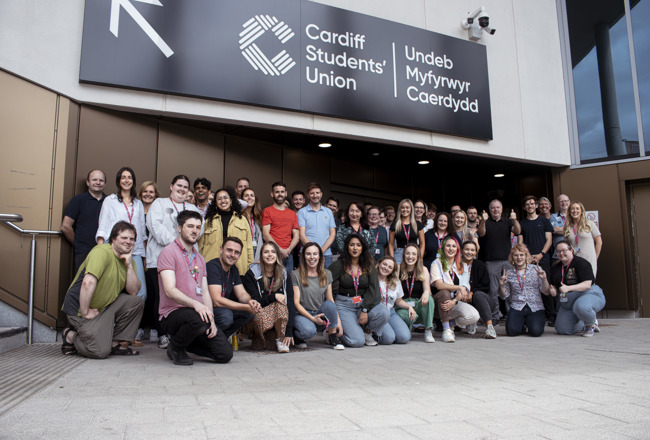- Share icon
- Share on LinkedIn
- Share on Twitter
- Share on Facebook

Read about Cardiff Students' Union's experience of receiving the Cynnig Cymraeg (Welsh Offer) below.
Cardiff Students' Union is a charity with over 100 full-time staff and is committed to improving and supporting the experience of all students as they study at Cardiff University. Since we appointed our first full-time Welsh Language, Community and Culture Vice-President this year, we have been busy developing and expanding our Welsh language provision. Cardiff students have a rich history of campaigning, developing and supporting Welsh provision, and we are proud to be able to support this work in the Union.
What Welsh services do you offer?
As an organisation that has representation and freedom of expression at the heart of our values, we enable any student to contribute to our democratic forums in Welsh, ensuring that simultaneous translation is available and that our materials are provided bilingually. Our content on social media is very often produced bilingually and we are preparing to take this even further.
We are also in the process of creating a bilingual website and are investing in our translation capacity to ensure that Welsh is available without having to ask. Everyone also has the right to contact us in Welsh and we are committed to responding in their language of choice, looking to expand our Welsh provision across our services. In addition to this, we invest in our workforce by offering free Welsh lessons and ongoing opportunities to develop their skills.
Within our building, locations such as our music hall, night club, pub and multi-use spaces have their Welsh names, and Welsh can be seen on our signs, posters, notice boards and instructions. For us, the Welsh language is not words on signs in the Union, but rather a way of working, and we are on the path to improve and develop access to the Welsh language for the 35,000 or more students who are members of the Union.
Describe the process of creating a Welsh Language Development Plan, from the decision to prepare a plan to receiving recognition from the Commissioner.
We decided to apply for the Cynnig Cymraeg in order to recognise the work that has been done to improve our offer but also to promote the use of the Welsh language here.
It was a hassle-free and convenient process to apply for the recognition - we had to answer a questionnaire, develop a plan, and work with the Commissioner's Hybu team (promotion team) before submitting our final plan to the Commissioner. The Hybu team was always available to answer any questions and offer support and advice in developing our provision.
Why is it important that you have received Cynnig Cymraeg?
Receiving the recognition is extremely important to us in order to be able to continue to develop the Welsh language, show what is available, and encourage even more use of the Welsh language in the Union. Cardiff University has the largest number of Welsh-speaking students in Wales and being able to proudly demonstrate that the Welsh language has a home here ensures that our members can be proud of the Union that the Welsh language can be used, seen and heard.
What are the benefits of receiving the Cynnig Cymraeg?
As a charity, ensuring Welsh language provision can bring additional costs and implications when responding in tight time constraints, but the benefits far outweigh the cost. Being able to support our students, offer new opportunities and create a community is at the heart of what we do, and doing that in Welsh goes hand in hand.
Would you encourage others to work towards the Cynnig Cymraeg, and why?
Receiving the Cynnig Cymraeg enables us to keep going and to look at things in new ways, including drawing up a new language policy by June, and ensuring that the work continues into the future. We would encourage any charity or business to go for it, not only to receive approval but also to be able to offer their services in Welsh, and also to ensure that the public are aware of the ability to use their Welsh in places they are not to' expected sometimes.
Do you have any advice for any organisations that are considering working towards the Cynnig Cymraeg?
As for advice for others, go for it, don't hold back, and don't be afraid to ask for help. Many of the requirements are easy to fulfill and doing the small things very often ensures that the wider picture ensures a place for the Welsh language and to be proud of that.
